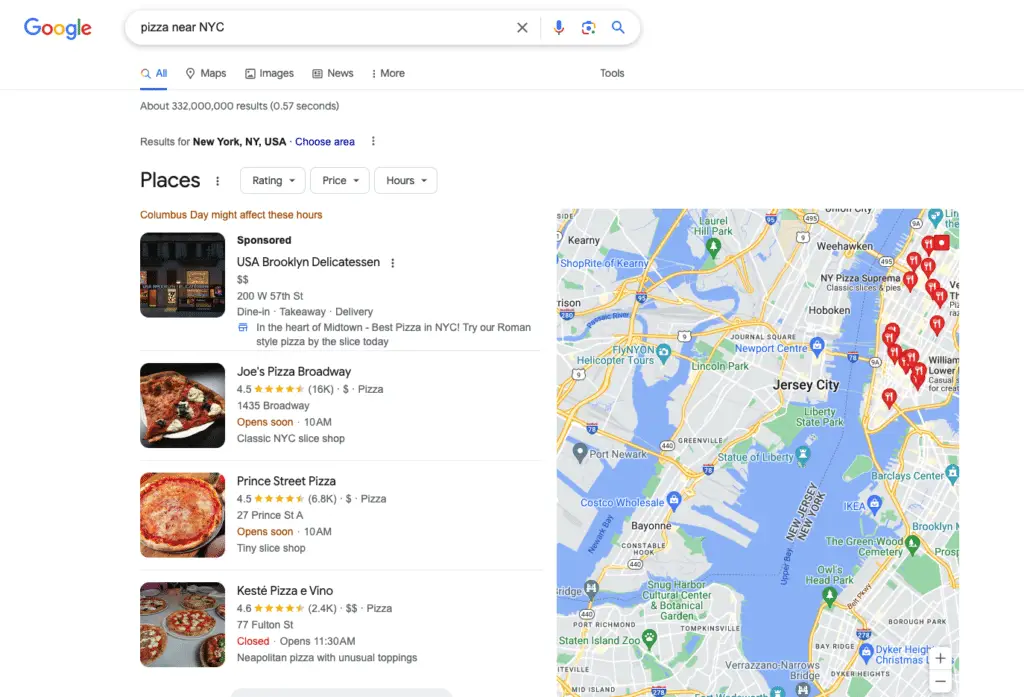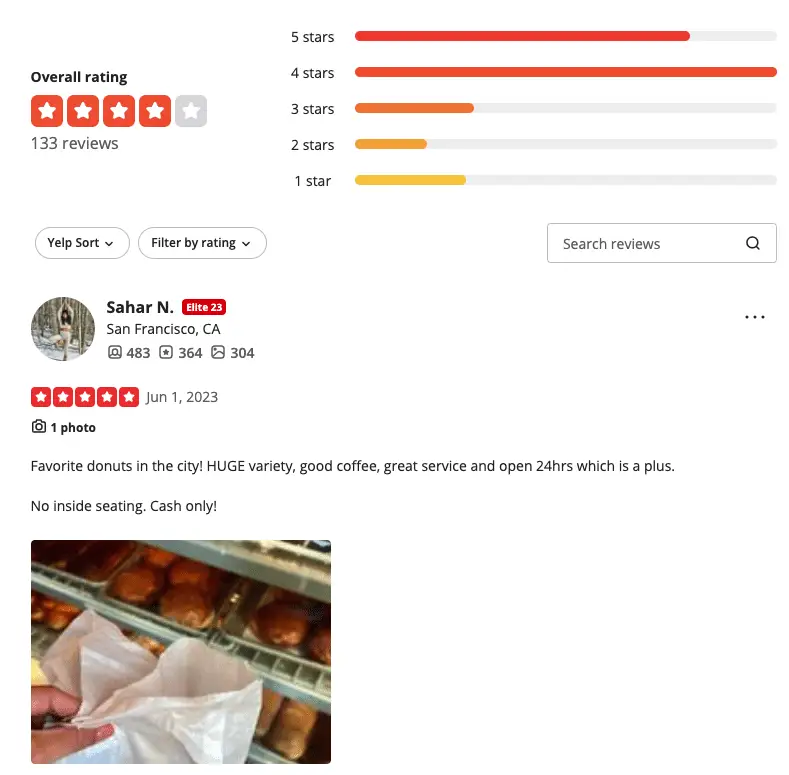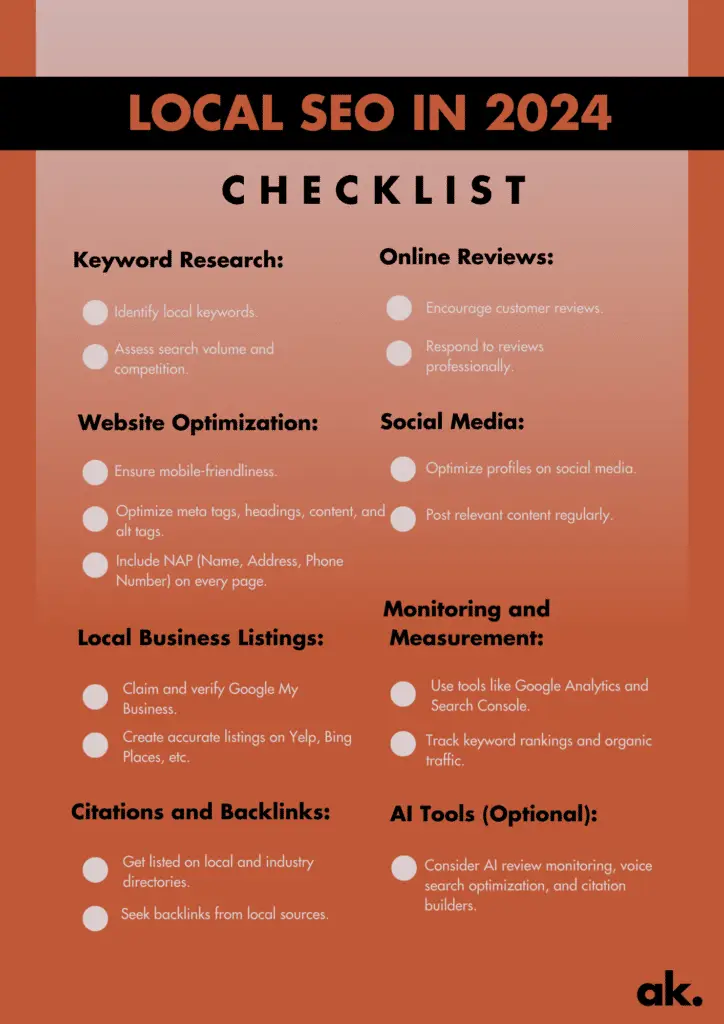Introduction to Local SEO
In today’s digital age, having a strong online presence is essential for businesses of all sizes. And when it comes to reaching your local audience, especially via search engines, there’s no better strategy than local SEO.
Disclaimer: I will recommend more sources and some tools, but they are not sponsored, or affiliated.
What exactly is Local SEO?
| Local SEO, or Local Search Engine Optimization, is the process of optimizing your website and online presence to rank higher in local search results. It involves targeting specific geographical areas and tailoring your content and strategies to appeal to local customers. With Local SEO, you can increase your visibility, attract more local customers, and ultimately boost your business. |
Why is Local SEO important for Businesses in 2024?
As we approach 2024, the importance of local SEO for businesses cannot be overstated. With the rise of voice search and mobile usage, more and more people are relying on search engines to find local products and services.
Stats: Studies show that over 46% of all Google searches have local intent.
By optimizing your website for local SEO, you can ensure that your business appears in these local search results, putting you ahead of your competitors. Whether you run a small local shop or a multinational corporation, this strategy can help you drive targeted traffic to your website, increase foot traffic to your physical store, and ultimately grow your bottom line.
Understanding the Local SEO Landscape in 2024
Before diving into the step-by-step guide, it’s important to understand the local SEO landscape in 2023 and what is expected next year. Search engines, like Google, are constantly evolving their algorithms to provide users with the most relevant and accurate search results. This means that the strategies and tactics that worked in the past may not be as effective today.
In the upcoming period, the key focus of (local) SEO is providing a seamless user experience. Search engines are placing more emphasis on factors such as mobile-friendliness, website speed, and user engagement.
Additionally, local signals such as the proximity of the searcher to the business location and the relevance of the search query to the business are becoming more important.
To stay ahead in the local SEO game, it’s crucial to keep up with the latest SEO trends and best practices. I wrote this guide to walk you through the key factors and provide you with actionable steps to boost your business.
So, let’s get right to it!
Key Factors for Local SEO Success in 2024
To achieve success with local SEO in 2023, there are several key factors that you need to focus on. These factors will help search engines understand the relevance and credibility of your business in the local context. Let’s take a closer look at each of these factors:
1. Keyword Research for Local SEO
Keyword research is the foundation of any successful SEO campaign, and local SEO is no exception.
Make sure to download the FREE keyword research template!
Start by identifying the keywords that are relevant to your business and have local intent. Use tools like Google Keyword Planner, SEMrush, or Ahrefs to discover these keywords and assess their search volume and competition.

2. Optimizing your Website for Local SEO
Start optimzing your website by ensuring that it’s mobile-friendly and loads quickly. Mobile-friendliness is not only important for user experience but also a key ranking factor in Google’s algorithm.
Once you have a list of target keywords, as mentioned above, optimize your website and content to incorporate these keywords naturally. This includes optimizing your meta tags, headings, content, and image alt tags.
Make sure to include your business name, address, and phone number (NAP) on every page of your website. This will help search engines associate your website with your physical location and improve your local rankings.
3. Creating Local Business Listings
Creating local business listings is another important step in improving your local SEO strategy. Start by claiming and verifying your Google My Business listing. This will allow you to provide accurate and up-to-date information about your business, such as your address, phone number, website, and opening hours.
In addition to Google My Business, consider creating listings on other popular local directories such as Yelp, Bing Places, and Apple Maps. Make sure to provide consistent and accurate information across all these listings.

4. Building Local Citations and Backlinks
Citations and backlinks are important signals that search engines use to determine the credibility and authority of your business. A citation is simply a mention of your business name, address, and phone number on other websites, while a backlink is a link from another website to yours.
To build local citations, start by getting listed on local directories, industry-specific directories, and local news websites. Make sure to provide consistent NAP information across all these citations. Additionally, reach out to local businesses, organizations, and bloggers in your area and ask them to link to your website.
5. Leveraging Online Reviews
Online reviews have become a powerful tool for consumers to evaluate businesses and make informed decisions. But did you know that online reviews also play a crucial role in local SEO? Search engines consider online reviews as a measure of your business’s reputation and credibility.
Encourage your customers to leave reviews on popular review platforms, but respond to both positive and negative reviews in a timely and professional manner. This will not only show potential customers that you value their feedback but also improve your visibility in local search results.

6. Using Social Media for Local SEO
Social media platforms are not only great for engaging with your audience and building brand awareness but also for boosting local rankings. Start by creating and optimizing your social media profiles on platforms such as TikTok, Twitter, Instagram, and LinkedIn. Hey, don’t forget Facebook, it still generates great results, believe it or not!
Regularly post engaging and relevant content on your social media profiles, including updates about your business, promotions, and local events. Encourage your followers to share, like, and comment on your posts.
Once you have implemented the above strategies, it’s important to monitor and measure the results of your efforts. Use tools like Google Analytics, Google Search Console, and SEO tracking tools to track your website’s performance, keyword rankings, and organic traffic.
7. Monitoring and Measuring your Local SEO Efforts
Regularly review your analytics data to identify areas for improvement and make data-driven decisions.
For example, if you notice that a particular keyword is driving a significant amount of traffic to your website, consider optimizing your content further for that keyword. By constantly monitoring and measuring your (local) SEO efforts, you can ensure that you stay on top of the game and continue to drive results.
Tools and Resources for Local SEO in 2024:
To help you with your optimzing efforts, here are some useful tools and resources:
- Google Keyword Planner: A free tool that helps you discover keywords with local intent and assess their search volume and competition.
- SEMrush and Ahrefs: Comprehensive SEO tools that provide keyword research, competitor analysis, and local SEO tracking features.
- SEO ideas to boost your rankings: A FREE cheat sheet with 5 quick-win SEO tactics that really work.
- Moz Local: A tool that helps you manage your local business listings, monitor your online reputation, and track your local rankings.
- FREE keyword research template to help you do your research quickly and effectively
- Google My Business: A free tool that allows you to manage your business information and appear in local search results on Google.
- Yelp for Business: A platform that allows you to create and manage your business listing on Yelp, a popular review site.
- Local SEO Chrome Extensions: there are several Chrome extensions that can aid in your local SEO efforts, such as SEOquake, or Keywords Everywhere. These extensions provide quick insights and data while browsing.
What about AI for Local SEO?
Ah, that AI hype…well, I must say that no matter what you think about ChatGPT and AI tools in general, if you are running a (local) business you must harness technology to stay in the game.
There are AI tools tailored for local SEO that can be super helpful! Here are my suggestions:
- Automated Review Monitoring Systems: AI-powered review monitoring systems like Review Trackers, BirdEye, and Reputation.com track and analyze reviews, providing real-time notifications and sentiment analysis to manage feedback and improve brand reputation.
- Voice Search Optimization Tools: Voice assistants have changed how people search for local businesses. AI-driven voice search optimization tools, such as Answer The Public and Bright Local’s Voice Search Readiness Test, help optimize content for voice queries, improving discoverability on platforms like Siri and Alexa.
- AI-Powered Local Citation Builders: AI citation builders like Whitespark, and Yext automatically submit business information to online directories, ensuring consistency and accuracy across platforms, boosting local search visibility.
To sum up: Checklist for (actionable) Local SEO in 2024

As we wrap up this guide, it’s clear that Local SEO is a powerful strategy for boosting your business in 2024. Remember to stay up-to-date with the latest trends and best practices in (local) SEO, and regularly monitor and measure your efforts.
Feel free to reach out if you need any assistance…or just want to share your success story after implementing these tips 😉.


